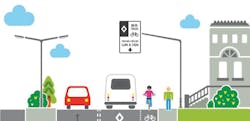STM Announces the Deployment of Bus Preferential Measures on Viau
The Société de transport de Montréal (STM) is announcing that two reserved lanes will become operational on Viau.
The first, between de Viterbe and Saint-Zotique, is reserved for buses and taxis, while the second, between Rosemont and Pierre-De Coubertin, is a pilot project, reserved for bus-taxi-bicycle use only. The pilot project for a bus-taxi-bicycle reserved lane will serve to test the lane-sharing ability of these three different transportation modes. Combined, the measures benefit some 13,000 trips taken daily, mainly by 136 – Viau bus users, since last August 11.
With an overall length of 5.8 km (both directions combined), the reserved lanes are operational from 6:30 to 9:30 a.m. in the southbound direction, and from 3:30 to 6:30 p.m. in the northbound direction, Monday to Friday. Other bus preferential measures will also be deployed along Viau in 2015 as part as a second phase, with the addition of priority traffic signals (white « candlestick » lights) for use during off-peak periods. Buses will be given priority when crossing intersections where these signals are installed.
"The nature of this pilot project, a bus-taxi-bicycle reserved lane, is a first for Montréal. Indeed, this initiative follows in the wake of a feasibility study of road-sharing by buses and bicycles and of giving it due consideration, as part of the deployment plan for future reserved lanes. I would like to take this opportunity to thank all our partners involved in making this project happen, namely the MTQ which invests 1.1 million dollars in the project, the Saint-Léonard, Rosemont–La-Petite-Patrie and Mercier–Hochelaga-Maisonneuve boroughs, the city of Montréal, the SPVM, Vélo Québec and the city’s Bureau du taxi. Reserved lanes make it possible to cut back travel times by about 10 percent, while improving bus punctuality, giving it a competitive advantage over solo car use. The deployment of bus priority measures along 375 km of roads is on track for 2017, when Montréal will mark its 375th anniversary," declared Philippe Schnobb, STM board chairman.
"The establishment of a reserved lane service in the Viau corridor is excellent news for public transit users, who will enjoy the bus service’s improved performance thanks to the added priority traffic signals. Road-sharing by buses, bicycles and taxis is a must in Montréal, and we want to make it safe and efficient. Also, by specifying the conditions under which the three different modes operate and by setting the conditions for success, the mixed-use lanes’ pilot project on Viau will serve to expand Montréal’s network of bicycle paths, by extending it north, between Sherbrooke and Rosemont during rush hour. This initiative shows how our administration is fully determined to promote the sharing of space by alternative transportation modes over individual car use, in an innovative and responsible way," asserted Aref Salem, Montréal executive committee member responsible for transportation.
"Vélo Québec is pleased by the establishment of this first section of mixed-use reserved lane in Montréal. We hope this pilot project produces conclusive results and gives the green light to extend the bus and bicycle road-sharing principle to other reserved lanes in Montréal," added Suzanne Lareau, president and CEO, Vélo Québec.
Bus priority measures (BPM) consist of installations on the road system that ensure priority is given to public transportation, thereby improving the reliability and on-time delivery of service. They include reserved lanes and bus priority traffic signals. So far, the STM has reserved lanes on 178 km of roadways and 116 intersections are equipped with priority traffic signals. The STM hopes to reach its target of deploying bus priority measures over 375 km by 2017.


